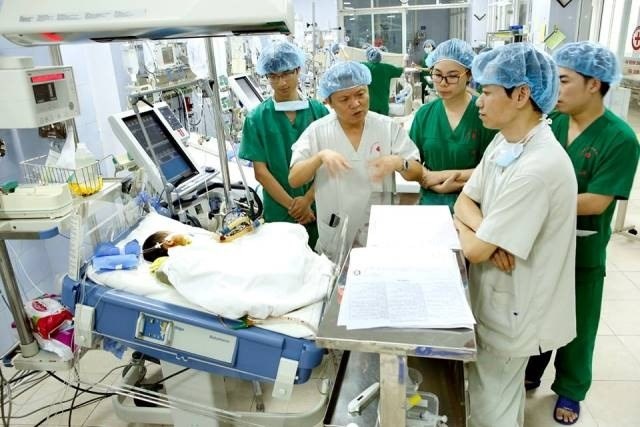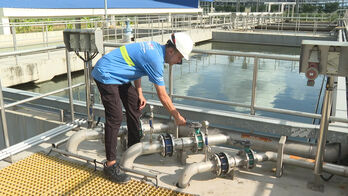
Doctors from the E hospital teach cardiovascular techniques to their colleagues from a satellite hospital.(Source: nhandan.com.vn)
Speaking at the event, Minster of Health Nguyen Thi Kim Tien said the project has contributed to improving ability on provision of medical services at satellite hospitals and strengthening patients’ confidence in hospitals outside city centres. This in turn increases patient visits and treatment rates at satellite hospitals.
“The project helps reduce the number of patients being sent from satellite hospitals to core hospitals for treatment and will ease overcrowding at core hospitals,” said Tien.
She said the satellite hospital model has been developed nationwide, not only in provincial and general hospitals but also at the district-level like the general hospitals of Moc Chau (Son La province), Muong Khuong (Lao Cai province) and Tam Duong Health Centre (Lai Chau province).
“Satellite hospitals are not only public medical facilities but also non-State hospitals,” said Tien. “In HCM City, some satellite hospitals attracted many patients visiting for examination and treatment.”
“Professional skills of doctors at provincial and district hospitals were improved,” said Tien. “Doctors from core and satellite hospitals held consultations though telemedicine, meaning patients with complicated conditions were handled right at the district level, thus reducing accident and fatality rates.”
She added that doctors of central hospitals would have more time to do scientific research and develop modern techniques if professional skills of their colleagues at provincial and district levels were improved.
According to the Health Ministry’s Medical Service Administration (MSA) statistics, the project has developed 23 core hospitals with 127 satellite hospitals across the country after five years of implementation. Special priorities have been given to 10 professional fields that experience serious patient overcrowding, namely cardiovascular care, surgery, cancer treatment, obstetrics and pediatrics, emergency response and first aid, clinical hematology, heart and injury surgery.
Launched in 2013 as part of the Ministry’s plan to reduce hospital overload, the project aimed to improve satellite hospitals’ examination and treatment ability through training and by upgrading infrastructure, facilities and telemedicine capabilities.
At the event, core and satellite hospitals shared lessons and discussed measures to handle shortcomings.
MSA Director Luong Ngoc Khue said the rate of patients being sent to central hospitals for treatment has reduced in 85 percent of satellite hospitals and that patient congestion at central hospitals has also declined, especially at facilities in Hanoi and HCM City.
Five years after implementation, 23 core hospitals have transferred nearly 2,000 medical techniques to satellite hospitals. Many complicated techniques were transferred successfully such as liver surgery from the E hospital and digestion and urinary cancer surgeries from the K (Cancer) hospital, according to Khue.
He said satellite hospitals must be equipped with medical facilities and medicine that meets transferred techniques. Some hospitals were short of skilled workers, especially doctors.
“On-site training and technique transference should be strengthened along with after-training supervision in efforts to transfer modern surgery techniques,” he noted.
“Patient congestion was reduced at central heart hospitals like the National Heart Hospital and the Hanoi Heart Hospital and in other fields like cancer and tumour treatment, pediatrics, obstetrics, injuries and orthopedics,” Khue added./.
VNA
 Manufacturing enterprises join hands for green environment and sustainable development
Manufacturing enterprises join hands for green environment and sustainable development



